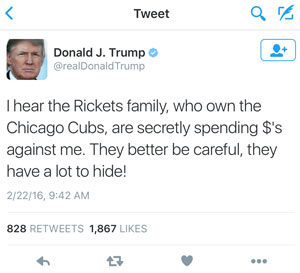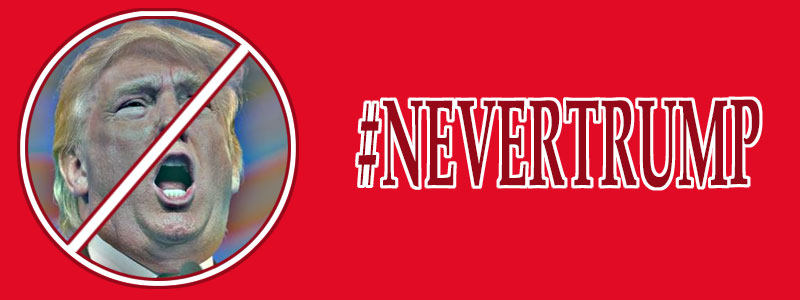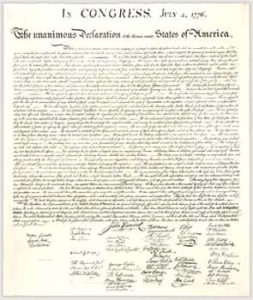This article is late in being written. I first thought about writing something about my opposition to Donald Trump’s candidacy back before the Vermont primary, but somehow I never got around to writing it. Then, as he was battling with Ted Cruz, I thought it would be a good time to write it finally. Again, I never seemed to find the time or energy to write it then either. Now, now that Trump is the presumptive nominee for the Republican party, I finally do have the energy and time, though it may not do much good.
There are things I like about Trump
Even though I oppose the idea of Trump as this country’s president, there are things about him that I find appealing. He is unashamed of his success. It is refreshing to have a candidate in the United States who says, essentially, “I’m rich, successful, and damned proud of it.” Romney was also a successful businessman, arguably more so than Trump, but I never got the sense that he could defend his success, or that he was proud of it. The United States has always been a country where the dream is to become successful, and you cannot represent that dream if you cannot celebrate and defend your own success.
There are issues in foreign policy that I agree with Trump on. Recently he made comments about other nations need to stand up and pay a greater amount towards their national defense. While he might have presented this idea in a better way, fundamentally I think that is correct. Why should the United States be spending taxpayer money on the defense of other countries? (Or worse, American lives when there is no threat to America.) We have been, in essence, subsidizing the welfare states of these countries by removing from them the necessity of providing for their defense. Certainly the United States needs to maintain forces sufficient to protect the rights of our citizens from foreign threats, but why must we also maintain forces to defend the citizens of other countries? (It is interesting that those who criticize Trump for this kind of statement are often those who complain how much we spend on the military.)
I think Trump does believe in American exceptionalism, and he wants to “make America great again.” He just doesn’t understand what made America great in the first place.
What makes America great?
What makes America great are the ideas, the principles, outlined in the Declaration of Independence. The idea that all men are created equal and have the right to life, liberty and the pursuit of happiness. The idea that it is to secure these rights that we form governments. Which is to say, the purpose of government is to protect the rights of the citizens, whether it be in the form of protecting them from criminals with a police force, from foreign invaders with a military, or providing a means to adjudicate peacefully disputes with a court system founded on objective laws.
With protecting rights being the sole purpose of government, we must understand what rights are. Rights are the means of restraining society by the requirements of morality, the requirements of man’s life qua man. As philosopher Leonard Peikoff put it:
Now you see these are all one issue. Ethics is simply life is the standard and all that requires. Politics is simply to achieve life in an organized group; this is what they must leave you alone in These are the areas they cannot touch. They have to let you do the basic things that human survival requires.
Ethics, morality, tells us that each individual must act to produce the values that sustain his life, his life as a human being through the entirety of his life. Not just the obvious things like food, clothing, shelter, medicine and the like, but also art and entertainment which are just as necessary for leading a full, human life. None of these values are given to us in nature; we must use our minds, our reason, to figure out how to produce them. In society, politics protects the freedom to produce values that ethics requires. Since you need to think, produce, judge and so forth to live, rights protect your ability to do these things in society. Note, rights are protections of your freedom to act, not guarantees of success in, or results from, those actions. (So, for example, you can have the right to seek a job but not the right to a job.)
The only thing that can prevent you from performing these actions is physical force initiated by another person. The government’s responsibility is to protect each individual from physical force, whether it be a thug robbing you, a foreign invader destroying your property or even disagreements over a contract (honest or otherwise). To achieve this, we delegate to the government the right to use force, except in cases of emergencies, putting the use of force under the control of objective laws.
America was the first country with a government based, from its inception, on individual rights, and the Constitution was written to protect them. No matter how imperfect the implementation, it was these principles that made America great. The decline in America has been caused by the increasing failure to protect these rights.
Would President Trump protect individual rights?
If individual rights are the source of American greatness, will Trump act to protect the rights of Americans? While the government in America is meant to protect citizens from the initiation of force from sources both foreign and domestic because it has the legal monopoly on the use of force it has the potential to be the greatest violator of our rights. I think under Trump our rights would certainly be at risk.
The most crucial right in America is the right to free speech. It is through communicating ideas freely, even if the idea expressed are unpopular, that reason is allowed to function. Communicating ideas makes it possible to persuade people and if we prohibited people from doing this, all that is left is to use force. Trump’s statements in the area of free speech give ample evidence that he would not protect this crucial right. A year ago, when Islamic jihadists attempted to attack the Draw Mohammed contest in Garland, Texas, Trump’s response was, in essence, “I respect the right to free speech, but do they have to offend people? They are just asking for trouble.” The freedom of speech must by exactly the right to offend people. As Yaron Brook pointed out in a recent radio broadcast, the Declaration of Independence was certainly offensive to King George. The people who were advocating for an end to slavery were undoubtedly offending slave owners and those who believed blacks were inferior to whites. Should the Founding Fathers or the abolitionists have been silenced because some found their ideas offensive? And if we should silence speech because it is offensive to someone, who gets to determine which offensive ideas to suppress? After all, abolitionists certainly found  the idea of slavery at least as offensive as slave owners found the idea of freeing the slaves. Trump’s statements indicate he feels that the government, in other words, he, should be the one to decide. Witness his threats to pursue anti-trust action against Amazon because the Washington Post, owned by Amazon’s Jeff Bezos, is publishing articles critical of Trump. Or the threats Trump issued throughout the campaign against those who dared to oppose him (e.g. here). Or the threat to widen libel laws so he could go after people who wrote “mean” things about him. He has also expressed a desire for campaign finance reform, a move to restrict the individual’s political speech.
the idea of slavery at least as offensive as slave owners found the idea of freeing the slaves. Trump’s statements indicate he feels that the government, in other words, he, should be the one to decide. Witness his threats to pursue anti-trust action against Amazon because the Washington Post, owned by Amazon’s Jeff Bezos, is publishing articles critical of Trump. Or the threats Trump issued throughout the campaign against those who dared to oppose him (e.g. here). Or the threat to widen libel laws so he could go after people who wrote “mean” things about him. He has also expressed a desire for campaign finance reform, a move to restrict the individual’s political speech.
Our right to liberty encompasses many other rights, among them the right to associate, or not associate, with whoever we choose. This freedom of association, which applies to both social and business relationships, means that each individual has the right to determine who they will associate with and under what conditions they will do so. For businesses, this right is already under assault today, and Trump shows no sign of reversing that trend. Whether it is his recent statement of openness to raising the minimum wage, his consistent claim that he would impose heavy tariffs on imports, or his dislike of immigration, Trump is no defender of the individual’s freedom of association. If a young worker is willing to accept less than the minimum wage to get the experience he needs to earn a higher wage, Trump will prevent him. If a low-income worker wants to buy inexpensive, but decent quality, products from China because that is what he can afford, Trump would have him do without. If a company’s management believes that hiring a foreign worker is best for their company, Trump will replace their judgment with his. Trump would do this not by persuading the employer that the higher wage or the American worker is in the employer’s rational interests, or the poor worker that it is better for his life to buy a more expensive American product. He would do this with the threat of a gun, which is what all government action reduces to. All of these actions violate the rights of Americans, and because they are immoral, all rights violations are immoral, they are disastrous, economically in this case. Tariffs were a major reason why a recession became the Great Depression, and the minimum wage is the reason why there is such a high unemployment rate among young and unskilled workers.
Perhaps the most fundamental right is that of property. Without the right to gain, keep, and dispose of property, whether it be physical property or our intellectual, no other rights are possible. How can you have a right to your life if you do not have the right to earn and use the means to sustaining that life? How can you have a right to speech if you do not have the right to the values that allow you to make your speech heard? Here as well Trump shows himself to be an enemy of rights. That Trump has attempted to deprive people of their property in the past via eminent domain is widely reported. Trump’s fondness for eminent domain is not merely something in the past. He continues to support it, even in cases of it benefiting a private developer, stating during his campaign, “I think eminent domain is wonderful.” If Trump is willing to take the home of an elderly woman to build a parking lot, can there be any doubt that he would favor taking our money, guns, or ideas if he felt it served some end that he deemed to be in the “public interest?” Or punish you if you used your property in a way he didn’t like?
The pattern is clear, report on a news story unfavorable to him, he may follow an ally’s advice and pull your broadcast license. Move your company out of the United States because you feel it is in your and your shareholders’ best interest, he will put a crippling tariff on your goods. Own a newspaper that does its job vetting a candidate, he will threaten you with an anti-trust prosecution.
All the major candidates are horrible
While there are certainly differences between Trump’s positions and those of his opponents – Hillary’s push for stricter gun control laws or Bernie’s push to break up big banks – in many cases there is little daylight between them. Trump claims to be in favor not of free trade but fair trade, so does Bernie Sanders. Trump is for restricting political speech through changes in campaign finance, and so are both Bernie and Hillary. Trump believes that some companies aren’t paying their fair share of taxes, and you can hardly listen to a Sanders speech without hearing the same thing. Bernie Sanders is for what he calls “Medicare for all,” Trump has touted the success of single-payer systems in Canada and Scotland. Both Hillary and Bernie favor drastic increases in the federal minimum wage (only differing on how high to push it), and Trump now says he is open to the idea. (Maybe, sort of. With Trump, it is often hard to tell.) Trump believes companies who move production out of the country should be punished with a tax; Bernie believes that no company has the right to “disrupt” a community in search of a better deal. The fact is that all of these candidates are horrible for America. Their policies will be economically disastrous, and while they may not immediately lead to a collapsing totalitarian and socialist state as we see now in Venezuela, they can certainly open the door wider to it.
The question thus becomes, how do we avert the coming disaster? Click & Tweet!Capitalism is our only hope, and that is why I will not support Trump
The only thing that can make America great again is a return to the principles that America was founded on, the principles of individual rights. The only thing that can make America great again is a return to capitalism. Click & Tweet! Actual capitalism, not the mixed, crony system we have today. A system enshrined in the founding documents of this country. A system that exists solely to protect the rights of each individual but otherwise leaves them free to live their lives, to pursue their own happiness. A system where the government has no special favors to bestow or penalties to inflict. A system of freedom.
It is because capitalism is our only hope that I can never support Donald Trump. Click & Tweet! While Trump is the furthest things from an advocate of capitalism, being an arch example of a mixed economy crony, many people view him as one. After all, he is a billionaire who is proud of how much he makes, so he must be a capitalist. It is because of this mistaken belief on the part of the public that a Trump presidency is much more dangerous to the future of America than either of his Democrat rivals. Not because his ideas are, on balance, any worse than their ideas, but because capitalism will receive, wrongly, the blame for the results of his ideas. When the policies of a president viewed as a capitalist lead to disaster, as Trump’s tariff plan certainly will, it will discredit the very idea of capitalism for years to come. The nation would continue its turn away from freedom and towards some form of statism, either socialism or, more likely, fascism, which is the direction that American government already leans.
What can we do?
“Always vote for principle, though you may vote alone, and you may cherish the sweetest reflection that your vote is never lost.”-John Quincy Adams
If a Trump presidency is the worst possible outcome for America, what does someone who loves liberty, who is a capitalist in the proper sense of the word, do? Jonathan Hoenig, who has much the same opinion I do, says he will vote for Hillary to help prevent Trump from becoming president. On a recent podcast, Amy Peikoff advocated for voting in a way that the winner is the one with the least chance to claim they have a mandate for their policies, which in Amy’s judgment suggests not voting for Hillary. This strategy would seem to indicate voting for Gary Johnson, or some other third-party candidate, or simply staying home.
Living as I do in very blue Vermont, my vote in the presidential election won’t have the slightest impact on the outcome. Vermonters will certainly vote overwhelmingly for the Democrat nominee, especially if that nominee turns out to be Bernie Sanders. Thus, my vote is not needed to ensure Trump does not win the state and so I am free, as I would like to think I would be in any event, to vote according to my principles. I don’t know if that means I will vote for Gary Johnson or stay home, but I can guarantee I will never vote for Trump.


